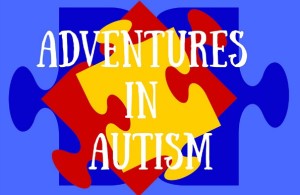This article was previously published in Abby’s column on Patheos.com. When my son was younger, he was overly emotional. I used to joke that he was my little drama queen. We would come home from a long day where he was reasonably well behaved, but the moment we got home he would throw himself on the floor and have a royal tantrum. Sometimes he didn’t even make it home before this started. He would start screaming in the car and I didn’t know why.
 I’ll never forget one time when he decided he was DONE while we were grocery shopping. The looks of the other mothers and whispers of grandmothers were awful. But I knew it wasn’t misbehavior. He just couldn’t take another minute. He was in meltdown mode.
I’ll never forget one time when he decided he was DONE while we were grocery shopping. The looks of the other mothers and whispers of grandmothers were awful. But I knew it wasn’t misbehavior. He just couldn’t take another minute. He was in meltdown mode.
When we learned he was on the Autism Spectrum, it was a huge blessing. Because now we had experts who told us that all we were experiencing was normal. And they taught me coping skills that I wouldn’t have found without them. So I would like to share a few things that I have learned from the experts and a few things I have found for myself over the years. And hopefully, we can all learn together.
Recognizing an Autism meltdown
I’ve learned to watch for the signs of a full-blown Autism meltdown. They can come from out of nowhere. However, when you know the signs you can treat the problem quickly and efficiently.
There are beginning symptoms of a pending meltdown if you watch for them. For us, this is what happens.
1-He will show physical signs.
We can be in a crowd, playing with other kids, or by ourselves at the grocery store. I can tell when he is beginning to feel overwhelmed, or needs a break because his cheeks will get flushed. Sometimes his voice will take on a certain stressed tone. And if it has been going on long enough he will also start staring off into space, or get a glassy-eyed expression. This is him turning inward and taking the mental break when he can’t get the real break he needs.
2- He stops listening to instruction
 For my son, he stops listening when he is overwhelmed. It’s like his ears and his brain isn’t connected anymore. I can stand two feet away from him and tell him not to do something or touch something. And I’m talking to a brick wall. The message isn’t getting through. At this point, I usually need to take his hand and guide him instead of talk to him.
For my son, he stops listening when he is overwhelmed. It’s like his ears and his brain isn’t connected anymore. I can stand two feet away from him and tell him not to do something or touch something. And I’m talking to a brick wall. The message isn’t getting through. At this point, I usually need to take his hand and guide him instead of talk to him.
3- He starts getting physical and loud
His temper is getting shorter as things progress. This is the final stage before we have a full-blown fit. He will start getting pushy with other kids. And sometimes he will plant his body in front of me to try to stop me from going where I want to go. At this point you need to initiate “Meltdown Protocol” or things will get ugly. Let me illustrate.
Meltdown at a pool party
Several months ago we were invited to a kid’s pool party. There were lots of kids there. The day was almost 100 degrees. So the adults just let the kids play while we tried not to expire. I get terrible hot flashes and honestly hugged an icepack for as long as it stayed cold. I kept checking on my son, but he was doing surprisingly well. So we continued to enjoy the party.
 Then out of the blue, my son started screaming at the top of his lungs and trying to force everyone out of the pool. I could tell that he needed a quiet moment and was trying to do a dead man float- which really relaxes him. But you can’t do that kind of thing at a pool party. So the screaming began.
Then out of the blue, my son started screaming at the top of his lungs and trying to force everyone out of the pool. I could tell that he needed a quiet moment and was trying to do a dead man float- which really relaxes him. But you can’t do that kind of thing at a pool party. So the screaming began.
My husband and I went into action. We immediately removed him from the pool and brought him to a quiet place in the shade. I laid out a towel for him to sit on, we wrapped him up in another towel, got him a cold drink, and a PB&J sandwich. Then we let him decompress.
I stayed close by, but I could see the glazed look in his eyes that told me he had been overwhelmed and would not recover quickly. So we prepared to head home. But it was really good for our family to hear the meltdown, see how we helped him, and know that he wasn’t being a brat.
It’s not “Bratty” behavior
 I’ve been asked how I can tell an ASD meltdown from bad behavior. To me, the key is being able to tell that the child has reached the end of their rope. There isn’t a smirk while they try to get their way. They honestly can’t see how what they are doing is not going to get the results they want. But there is a real need there too.
I’ve been asked how I can tell an ASD meltdown from bad behavior. To me, the key is being able to tell that the child has reached the end of their rope. There isn’t a smirk while they try to get their way. They honestly can’t see how what they are doing is not going to get the results they want. But there is a real need there too.
For my son at the pool, he needed to calm down. He realized that he needed to calm down, and tried to help himself with a little aqua therapy. (He was doing the same floating technique I taught him.) But he couldn’t see that you can’t have quiet floating therapy in a pool full of children. So he tried to correct that, not realizing that you can’t empty the pool during a pool party. Do you see where I’m going? He had to have help.
He could logically see his own need. But he couldn’t meet that need because of the ambiguous social structure surrounding the pool party.
I’m not always able to see the meltdown coming so clearly. Often it comes out of the blue, and we can only piece together the disaster after the fact. But I’ve learned when he loses control and starts yelling, that we need to ‘initiate meltdown protocol’.
Meltdown Protocol- helping him cope
1- Remove him from the situation.
2- Bring him somewhere quiet.
3- Help him relax
4- If possible, go home so he can have longer decompression time.
After a meltdown, my son is always exhausted. He will take a nap. Or he will watch a movie or Ipad video, and generally, needs to be left alone for a while. But if you know what to watch for, and what to do to help him feel better, life is less stressful. I hope that these few tips will help. Each kid is different, so your signs of the meltdown may be different. But taking them away from the stress causing stimuli and giving them a chance to relax is always a good idea.
Abby is capable and caring. She is learning more about Autism and parenthood every day. Having completed training to be an RBT (Registered Behavior Technician) for ABA therapy she is beginning to understand her son. And even though she is the first to admit she makes a lot of mistakes, she is so grateful to be on this journey. She comes from a family with many autistic members. She invites us to join her, as she shares her adventures. She wishes to emphasize that Autism is a difference not a defect. If you or a family member have autism, Abby wants you to know that the challenges can be overcome, and there are blessings in autism. You or your loved one are not sick or broken. Together we will teach the world this new language.








Thank you for sharing! As a former Primary president I was dying to know more, but no one would help. We used to have multiple kids in our Primary with autism (one child) or ADD/ADHD (four children) challenges and I never felt educated enough. And I’m sure the parents were just trying to figure it out as well. Thanks! These kind of tidbits are exactly what we all need to hear.